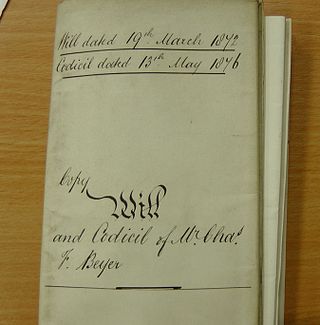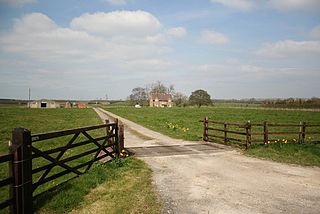
Estoppel is a judicial device in common law legal systems whereby a court may prevent or "estop" a person from making assertions or from going back on his or her word; the person being sanctioned is "estopped". Estoppel may prevent someone from bringing a particular claim. Legal doctrines of estoppel are based in both common law and equity. It is also a concept in international law.

Estoppel in English law is a doctrine that may be used in certain situations to prevent a person from relying upon certain rights, or upon a set of facts which is different from an earlier set of facts.

Lloyds Bank plc v Rosset[1990] UKHL 14 is an English land law, trusts law and matrimonial law case. It specifically deals with the translation into money of physical contributions from a cohabitee or spouse, under which its principles have been largely superseded.

Bruton v London and Quadrant Housing Trust[1999] UKHL 26 is an English land law case that examined the rights of a 'tenant' in a situation where the 'landlord', a charitable housing association had no authority to grant a tenancy, but in which the 'tenant' sought to enforce the duty to repair on the association implied under landlord and tenant statutes. The effect of the case is to create the relationship of de facto landlord and tenant between the parties.

Re Ellenborough Park[1955] EWCA Civ 4 was an English land law case which reformulated the tests for an easement. It found an easement to use a communal garden to be a valid easement in law. There is no requirement for all of the houses to be immediately next to the garden to benefit from it.

DHN Food Distributors Ltd v Tower Hamlets London Borough Council [1976] 1 WLR 852 is a UK company law case where, on the basis that a company should be compensated for loss of its business under a compulsory acquisition order, a group was recognised as a single economic entity. It stands as a liberal example of when UK courts may lift the veil of incorporation of a company.

The Law of Property Act 1989 is a United Kingdom Act of Parliament, which laid down a number of significant revisions to English property law.

Crabb v Arun District Council [1975] EWCA Civ 7 is a leading English land law and contract case concerning "proprietary estoppel". Lord Denning MR affirmed that where agreements concern the acquisition of rights over land, there is no need for both parties to provide a consideration for upholding the bargain. While promissory estoppel cannot found a cause of action it was held that in the peculiar situation of land, consideration is not necessary at all.

Street v Mountford[1985] UKHL 4 is an English land law case from the House of Lords. It set out principles to determine whether someone who occupied a property had a tenancy, or only a licence. This mattered for the purpose of statutory tenant rights to a reasonable rent, and had a wider significance as a lease had "proprietary" status and would bind third parties.
Cobbe v Yeoman's Row Management Ltd[2008] UKHL 55 is a House of Lords case in English land law and relates to proprietary estoppel in the multi-property developer context. The court of final appeal awarded the project manager £150,000 on a quantum meruit basis for unjust enrichment because Yeoman's Row had received the benefit of his services without paying for that. The court refused to find or acknowledge a binding contract, prior arrangement with a third party or promise, overturning a £2m award on the basis of a possible lien arising from a promise over the property. The court found a non-binding agreement in principle, entirely subject to the owner's final say to take into account for example their view of the market; this was the basis on the facts on which the parties were proceeding.

Proprietary estoppel is a legal claim, especially connected to English land law, which may arise in relation to rights to use the property of the owner, and may even be effective in connection with disputed transfers of ownership. Proprietary estoppel transfers rights if

Jennings v Rice is an English land law case concerning proprietary estoppel.

Dillwyn v Llewelyn [1862] is an 'English' land, probate and contract law case which established an example of proprietary estoppel at the testator's wish overturning his last Will and Testament; the case concerned land in Wales demonstrating the united jurisdiction of England and Wales.

English land law is the law of real property in England and Wales. Because of its heavy historical and social significance, land is usually seen as the most important part of English property law. Ownership of land has its roots in the feudal system established by William the Conqueror after 1066, and with a gradually diminishing aristocratic presence, now sees a large number of owners playing in an active market for real estate.

Earl of Oxford's case (1615) 21 ER 485 is a foundational case for the common law world, that held equity takes precedence over the common law.
Eves v Eves [1975] EWCA Civ 3 is an English land law case, concerning constructive trusts of the family home.

National Provincial Bank Ltd v Ainsworth [1965] is an English land law and family law case, concerning the quality of a person's interest in a home when people live together, as well as licenses in land.

Gillett v Holt [2000] is an English land law case concerning proprietary estoppel and a farming businesses' dispute. The case focussed on a farmer of a portfolio of farming businesses without any obvious heirs who made many promises and assurances of inheritance to two partial farm managers who were neighbours or tenants of his, one of whom had farmed for 38 years, the other co-farmed for the last 5 years of those 38 years.

Greasley v Cooke [1980] 3 All ER 710 is an English land law case concerning proprietary estoppel.
Thorner v Major [2009] UKHL 18 is an English land law case, concerning proprietary estoppel.















